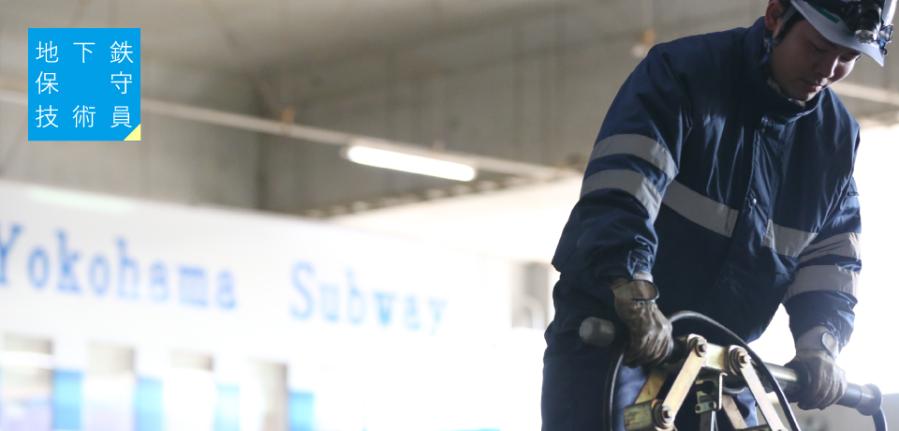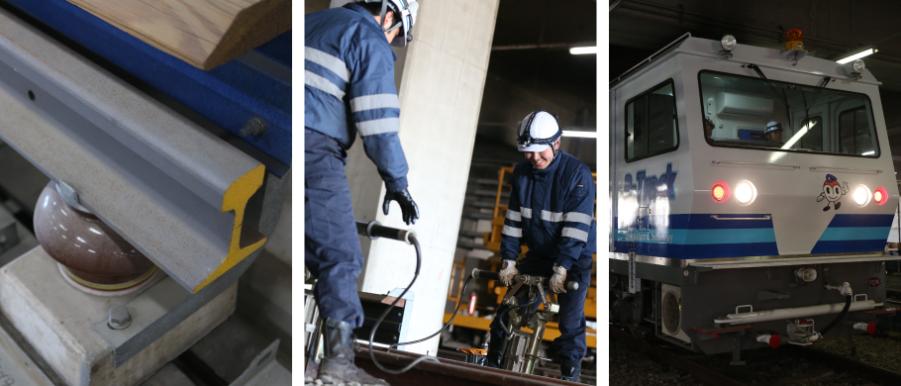Here's the text.
Subway maintenance engineer (civil engineering track)
Last Updated January 14, 2022



What is a subway maintenance technician (civil engineering track)?
The track, which runs 180 trains of 30 tons per car a day, is always in harsh conditions. It is the job of the subway maintenance technician (ho line) to quickly detect the wear of the track, the gap in the width of the rail, and the sinking of the ballast (gravel) and repair and construct it. The important thing is "eyes" and "ears" that do not overlook slight changes. Skilled skills that make full use of the five senses ensure the safety of train operation.
①Inspection, inspection and inspection of railway tracks, tunnels, viaducts, etc.
Rails and tunnel inspections require visual inspection on foot. Walk every day like an eye plate and check for deflections and cracks on the rails, loosening the concluded bolts, and abnormalities in the upset during operation, visual inspection and sound inspection. The more you experience, the more you develop your ability to find something unusual.
②Based on the inspection, construction such as replacing rails, sleepers, and solidifying roadbeds
If it is found necessary to replace rails and sleepers or repair ballast, it will be done from the last train to the first train. Among them, the large-scale rail exchange is a flower-shaped business. When you finish late-night work and see the train running in the morning without anything, you will gain a sense of accomplishment.
③Attendance of outsourcing work such as improvement of railway tracks and tunnels
When requesting construction from an external contractor, the staff of the facility ward will be present to confirm safety and supervise the work contents. Construction management will be carried out with the support of staff who know the site, such as confirmation of the last train and the first train, and arrangement of parts.
④Special qualifications unique to subways are also considered
While experiencing patrols, inspections, and construction, it is also possible to acquire "technicians", "surveyers", "railway design technicians", "track construction managers", and "certifications such as driver's licenses for special vehicles". Please challenge yourself to become a human resource who can rely on others.
Workflow
| 8:30 | Drill call and section in charge |
|---|---|
| 8:30~12:00 | Track inspection of the section in charge (sound inspection, etc.) |
12:00~13:00 |
Lunch break |
| 13:00~17:00 | Check the track by train |
| 23:30~4:00 | Night work such as changing rails |
| 4:00~8:30 | Nap |
| 8:30 | Take over and go home |
For those who are considering applying
The safety of the railroad tracks is monitored 24 hours a day. In a work system that takes over duties like a relay, the body is capital, so daily health management is important. You may not get used to it at first, but as you gain experience, you will be able to get work tips and feel proud of the safety of the track.

Inquiries to this page
Transportation Bureau General Affairs Department Personnel Division
Telephone: 045-671-3164
Telephone: 045-671-3164
Fax: 045-322-3911
Email address: kt-jinji@city.yokohama.jp
Page ID: 588-045-200

